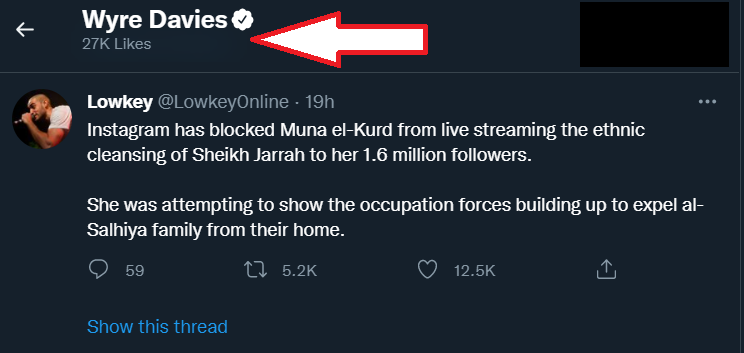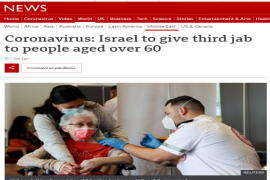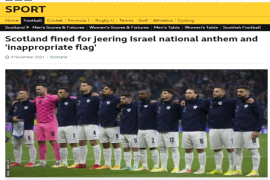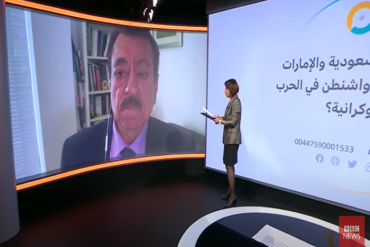On January 17th Israeli police arrived in the Sheikh Jarrah neighbourhood of Jerusalem in order to vacate – with court authorisation – a plot of public land designated for the construction of a special needs school which had been illegally taken over by Arab residents and turned into a plant nursery.
Thousands of miles away, the British rapper known as ‘Lowkey’ – a patron of both the ‘Palestine Solidarity Campaign’ and the ‘Stop the War Coalition’ whose anti-Israel activism and lyrics promoting antisemitism and 9/11 conspiracy theories are well known – posted a Tweet describing the evacuation of an illegally constructed business as “ethnic cleansing”.
Among the thousands of ‘likes’ for that Tweet was one from the BBC News & current affairs journalist Wyre Davies.

As a result of his ‘like’, that disinformation was promoted to former Jerusalem bureau correspondent Davies’ 24.2 thousand followers.
Back in September 2020, the then new BBC Director General ordered a review of the corporation’s guidance on social media use and claimed that the new version would be “rigorously enforced”.
That guidance on ‘Individual Use of Social Media’ includes the following: [emphasis added]
“Individuals working in news and current affairs (across all Divisions) and factual journalism production, along with all senior leaders have a particular responsibility to uphold the BBC’s impartiality through their actions on social media and so must abide by specific rules set out in this Guidance. […]
h) Do think about what your likes, shares, retweets, use of hashtags and who you follow say about you, your personal prejudices and opinions. […]
Section 2 Rule 3 above requires that you do not express a personal opinion on matters of public policy, politics, or ‘controversial subjects’ if your work requires you to maintain your impartiality, ie. if you are working in news and current affairs (across all Divisions) and factual journalism production or senior management. Nothing should appear on your personal social media accounts that undermine the perception of the BBC’s integrity or impartiality.
Expressions of opinion on social media can take many forms – from straightforward tweets, posts or updates, sharing or liking content, following particular accounts or using campaigning or political hashtags. You should consider carefully every comment before posting. […]
Be wary of ‘revealed bias’, whether through likes or re-posting other posts, so that a bias becomes evident…”
Not for the first time we see that guidance being ignored by Davies – providing insight into the personal opinions and “revealed bias” of a former Jerusalem bureau correspondent who covered Israel for three years between 2010 – 2013 as well as for brief periods in 2014 and 2019.
Related Articles:
BBC ESC: ‘LACK OF DUE ACCURACY’ ON DAVIES TWEET FROM OPERATION PILLAR OF CLOUD






Well that is the BBC in a nutshell make a new bunch of rules for staff to follow then just ignore any rule breaks committed by them thus promoting further support worldwide of the anti-Israel support machinery.